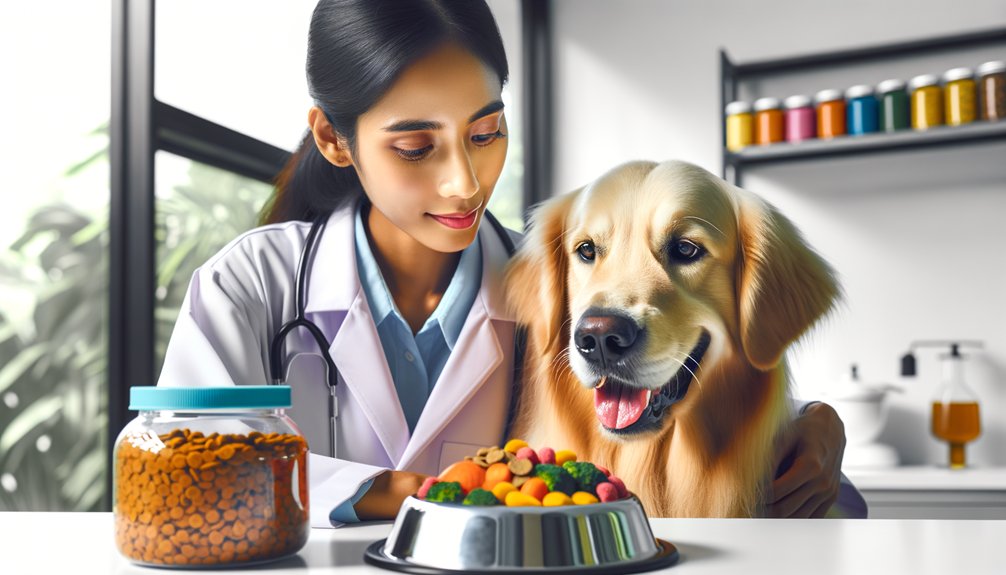Vets remain cautious about homemade dog food because, despite its appeal—control over ingredients and tailored diets—imprecise formulations risk nutritional deficiencies. Before modifying your dog’s diet, grasp the complex nutritional demands and consult experts. Explore why professionals hesitate and which critical factors demand your attention.
Key Takeaways
- Vets often caution homemade dog food due to risks of nutrient deficiencies and imbalances if not properly formulated.
- Properly balanced homemade diets can offer health benefits, especially for dogs with allergies or sensitivities.
- Collaboration with a veterinarian or pet nutritionist is essential to ensure nutritional completeness in homemade meals.
- Vets emphasize using fresh, high-quality ingredients and avoiding toxic foods when preparing homemade dog food.
- Many veterinarians recommend commercial diets unless owners work closely with professionals to design balanced homemade recipes.
Veterinary Perspectives on Homemade Diets

When you consider homemade diets for your dog, vets often highlight concerns about nutritional balance.
While homemade meals can offer health benefits, they also carry risks if not properly formulated. It’s important to understand both sides before making changes to your pet’s diet.
Nutritional Balance Concerns
Although preparing homemade meals for your dog can seem like a healthier option, veterinarians often caution that these diets may lack essential nutrients if not carefully formulated.
Without proper attention to dog food safety and ingredient sourcing, you risk unbalancing key vitamins and minerals.
To guarantee your dog thrives, consider these concerns:
- Missing vital nutrients like calcium, vitamin D, and taurine
- Imbalanced protein and fat ratios affecting energy levels
- Variability in ingredient quality due to inconsistent sourcing
- Potential for harmful ingredient interactions or deficiencies
- Difficulty replicating a complete, balanced commercial diet
Health Benefits and Risks
Why do many veterinarians remain cautious about recommending homemade dog diets despite their growing popularity?
While homemade meals can improve dental health through fresh ingredients and reduced additives, they also carry risks if not properly balanced. You might notice behavioral changes in your dog if nutrient deficiencies or excesses occur, affecting energy levels and mood.
Without precise formulation, homemade diets can lead to imbalances in essential vitamins, minerals, and proteins, potentially causing long-term health issues.
As a pet owner seeking the best for your dog, it’s important to collaborate with your vet to ensure meals meet all nutritional needs.
Together, you can enjoy the benefits of homemade food while minimizing health risks, fostering your dog’s well-being and happiness.
Benefits and Risks of Cooking for Your Dog
Since you’re contemplating cooking for your dog, it’s important to weigh both the benefits and risks involved. Cooking can help you control ingredients, which is especially helpful if your dog has pet allergies or sensitivities. Using proper cooking techniques ensures nutrients are preserved and harmful bacteria are eliminated.
Cooking for your dog lets you control ingredients and ensures safety, especially for pets with allergies or sensitivities.
However, improper cooking or ingredient imbalance can lead to nutritional deficiencies. You also risk exposure to toxic foods if you’re not careful. Here are key points to consider:
- Tailoring meals to address pet allergies
- Ensuring food safety through adequate cooking techniques
- Potential nutrient loss from overcooking
- Risk of unbalanced nutrition without veterinary guidance
- Avoiding harmful ingredients like onions or chocolate
Guidelines for Preparing Balanced Homemade Meals
When preparing homemade meals for your dog, you need to guarantee the diet is nutritionally complete and balanced. This means carefully selecting ingredients that provide essential proteins, fats, vitamins, and minerals.
Consult your veterinarian or a pet nutritionist to develop recipes tailored to your dog’s specific needs.
During homemade meal prep, prioritize fresh, high-quality ingredients and avoid toxic foods like onions or grapes.
Remember, dog treat safety is equally important—choose treats that complement the balanced diet without adding harmful additives or excessive calories.
Measure portions accurately to maintain a healthy weight and monitor your dog’s response to the new diet closely.



